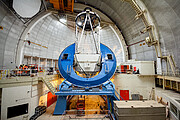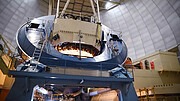DESI Team Receives Project Management Excellence Award from Department of Energy
The prestigious award recognizes the Dark Energy Spectroscopic Instrument, now operating at Kitt Peak National Observatory
29 October 2021
The US Department of Energy (DOE) has awarded its 2020 Project Management Excellence Award to the project team for the Dark Energy Spectroscopic Instrument (DESI), which recently embarked on a five-year mission to create the largest 3D map of the sky.
The most powerful multi-object survey spectrograph in the world, DESI is an international science collaboration managed by the Lawrence Berkeley National Laboratory (Berkeley Lab) with primary funding for construction and operations from the DOE’s Office of Science. DESI resides at the retrofitted Nicholas U. Mayall 4-meter Telescope at Kitt Peak National Observatory (KPNO), a Program of NSF’s NOIRLab.
Since beginning its survey in May 2021, DESI has already gathered spectra from approximately four million galaxies as part of its goal to observe over 30 million galaxies and 2.4 million quasars. This survey will help astronomers to construct a 3D map of the Universe in unprecedented detail and to better understand dark energy, which is causing the Universe’s expansion to accelerate.
Presented on 25 October 2021, the DOE’s 2020 Project Management Excellence Award recognizes nearly a decade of work by the DESI project team to bring the pioneering sky survey to life. According to DOE’s award citation, the team transformed KPNO’s Mayall telescope into the “most powerful multi-object spectrograph in existence,” while “exceeding the design requirements ahead of schedule and under budget.”
“This award goes to the whole DESI project team whose dedication and creativity brought this complex experiment to fruition, and we greatly appreciate the fantastic support we received from Berkeley Lab and the program office in DOE’s Office of Science,” said project director, Berkeley Lab’s Michael Levi.
More information
NSF’s NOIRLab (National Optical-Infrared Astronomy Research Laboratory), the US center for ground-based optical-infrared astronomy, operates the international Gemini Observatory (a facility of NSF, NRC–Canada, ANID–Chile, MCTIC–Brazil, MINCyT–Argentina, and KASI–Republic of Korea), Kitt Peak National Observatory (KPNO), Cerro Tololo Inter-American Observatory (CTIO), the Community Science and Data Center (CSDC), and Vera C. Rubin Observatory (in cooperation with DOE’s SLAC National Accelerator Laboratory). It is managed by the Association of Universities for Research in Astronomy (AURA) under a cooperative agreement with NSF and is headquartered in Tucson, Arizona. The astronomical community is honored to have the opportunity to conduct astronomical research on Iolkam Du’ag (Kitt Peak) in Arizona, on Maunakea in Hawaiʻi, and on Cerro Tololo and Cerro Pachón in Chile. We recognize and acknowledge the very significant cultural role and reverence that these sites have to the Tohono O'odham Nation, to the Native Hawaiian community, and to the local communities in Chile, respectively.
DESI is supported by the DOE Office of Science and by the National Energy Research Scientific Computing Center, a DOE Office of Science user facility. Additional support for DESI is provided by the US National Science Foundation, the Science and Technologies Facilities Council of the United Kingdom, the Gordon and Betty Moore Foundation, the Heising-Simons Foundation, the French Alternative Energies and Atomic Energy Commission (CEA), the National Council of Science and Technology of Mexico, the Ministry of Economy of Spain, and by the DESI member institutions.
The DESI collaboration is honored to be permitted to conduct astronomical research on Iolkam Du’ag (Kitt Peak), a mountain with particular significance to the Tohono O'odham Nation.
Current DESI Member Institutions include: Aix-Marseille University; Argonne National Laboratory; Barcelona-Madrid Regional Participation Group; Brookhaven National Laboratory; Boston University; Brazil Regional Participation Group; Carnegie Mellon University; CEA-IRFU, Saclay; China Participation Group; Cornell University; Durham University; École Polytechnique Fédérale de Lausanne; Eidgenössische Technische Hochschule, Zürich; Fermi National Accelerator Laboratory; Granada-Madrid-Tenerife Regional Participation Group; Harvard University; Kansas State University; Korea Astronomy and Space Science Institute; Korea Institute for Advanced Study; Lawrence Berkeley National Laboratory; Laboratoire de Physique Nucléaire et de Hautes Énergies; Max Planck Institute; Mexico Regional Participation Group; New York University; NSF’s NOIRLab; Ohio University; Perimeter Institute; Shanghai Jiao Tong University; Siena College; SLAC National Accelerator Laboratory; Southern Methodist University; Swinburne University; The Ohio State University; Universidad de Los Andes; University of Arizona; University of Barcelona; University of California, Berkeley; University of California, Irvine; University of California, Santa Cruz; University College London; University of Florida; University of Michigan at Ann Arbor; University of Pennsylvania; University of Pittsburgh; University of Portsmouth; University of Queensland; University of Rochester; University of Toronto; University of Utah; University of Waterloo; University of Wyoming; University of Zurich; UK Regional Participation Group; Yale University.
Founded in 1931 on the belief that the biggest scientific challenges are best addressed by teams, Lawrence Berkeley National Laboratory and its scientists have been recognized with 14 Nobel Prizes. Today, Berkeley Lab researchers develop sustainable energy and environmental solutions, create useful new materials, advance the frontiers of computing, and probe the mysteries of life, matter, and the universe. Scientists from around the world rely on the Lab’s facilities for their own discovery science. Berkeley Lab is a multiprogram national laboratory, managed by the University of California for the US Department of Energy’s Office of Science.
DOE’s Office of Science is the single largest supporter of basic research in the physical sciences in the United States, and is working to address some of the most pressing challenges of our time.
The National Science Foundation (NSF) is an independent federal agency created by Congress in 1950 to promote the progress of science. NSF supports basic research and people to create knowledge that transforms the future.
Established in 2007 by Mark Heising and Elizabeth Simons, the Heising-Simons Foundation is dedicated to advancing sustainable solutions in the environment, supporting groundbreaking research in science, and enhancing the education of children.
The Gordon and Betty Moore Foundation, established in 2000, seeks to advance environmental conservation, patient care, and scientific research. The Foundation’s Science Program aims to make a significant impact on the development of provocative, transformative scientific research, and increase knowledge in emerging fields.
The Science and Technology Facilities Council (STFC) of the United Kingdom coordinates research on some of the most significant challenges facing society, such as future energy needs, monitoring and understanding climate change, and global security. It offers grants and support in particle physics, astronomy, and nuclear physics.
Links
- More about DESI
- Main DESI webpage
- Photos of DESI
- Videos of DESI
- Photos of Nicholas U. Mayall 4-meter Telescope
- Videos of Nicholas U. Mayall 4-meter Telescope
- Berkeley Lab announcement
Contacts
Vanessa Thomas
Public Information Officer
NSF’s NOIRLab
Tel: +1 520-318-8132
Email: vanessa.thomas@noirlab.edu




